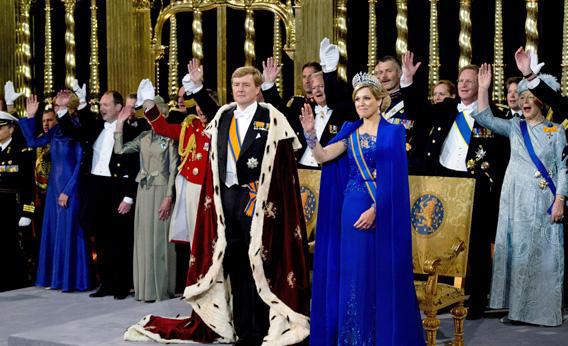Queen Beatrix of the Netherlands abdicated on Tuesday, making way for her son Willem-Alexander to become the first Dutch king in more than a century. European monarchs are largely powerless. Why do so many countries keep them around?
Because breaking up is hard to do. When asked whether they want to keep their monarchies, large majorities of Europeans answer “yes.” Around 80 percent of Dutch subjects want the royal family to stick around, and about the same proportion of U.K. citizens favor Queen Elizabeth II. But there’s a quirk in the polling data: Fewer than 1 in 4 Britons think the monarchy will actually last another century. This suggests that Europeans envision a future without kings and queens but don’t personally want to undertake the national convulsion that might accompany the change. Although monarchs these days are more likely to be voted out rather than guillotined or shot, overthrowing a monarch is an act of revolution, and Europeans have long since lost their taste for sudden political change. Countries historically only overthrow monarchies after a major crisis makes the system untenable. Kaiser Wilhelm, for example, was blamed for Germany’s defeat in World War I. Italy’s House of Savoy was overthrown for tolerating Mussolini, after a contentious national referendum.
Powerless monarchs bewilder many Americans, but, in fact, the arguments for and against them are fairly evenly balanced. Royal families are apolitical symbols of national unity and, in ideal circumstances, sources of pride. Queen Wilhelmina of the Netherlands, for example, became a national hero when she fled the Nazis and encouraged resistance from abroad. Monarchs sometimes intervene when the government veers off track. Spanish King Juan Carlos notably turned back fascism after the death of Franco. During the 1975 Australian constitutional crisis, Queen Elizabeth’s representative righted the teetering government by ousting the scandal-ridden prime minister. Many Europeans also have genuine affection for their monarchs. (The Explainer once heard an English mother lecturing her child during the changing of the guard at Buckingham Palace about why he should love the Queen.) On a more mundane level, monarchs can be lucrative. The British royal family brings tourists to England in droves.
The financial costs of monarchy are fairly modest. The British royal family, for example, costs the average taxpayer less than $1 per year and probably brings in far more than that in tourism dollars. (The Dutch monarchy takes home somewhat larger paychecks.) The more significant costs of monarchy are harder to measure. Critics argue that an aging white person is a lousy national symbol for an increasingly diverse Europe. Moreover, some political scientists theorize that a monarch undermines the feeling of ownership a citizen should have for his government. Then there’s the obvious problem of having an unaccountable hereditary leader sitting atop a democracy, even if the job entails very little power.
Without a completely convincing argument for or against their positions, the surviving European monarchs have proven surprisingly adept politically. They have surrendered power and land in exchange for their jobs. They have adapted their images to suit the times. The Dutch royal family are, along with their Danish and Scandinavian counterparts, the so-called “bicycle monarchs,” who eschew the pomp of a royal cavalcade for a simple bicycle, giving them the appearance of being an ordinary family. Willem-Alexander has neutralized the charge that he symbolizes the Netherlands of the past by marrying an Argentine woman, and the couple is regularly photographed visiting schools full of immigrant children. The British royal family works for a variety of charitable causes, in part to give their subjects a good reason to keep them.
Got a question about today’s news? Ask the Explainer
Explainer thanks Charles Ingrao of Purdue University, author of The Habsburg Monarchy, 1618-1815; Alison Frank Johnson of Harvard University, Paul Monod of Middlebury College, author of Solomon’s Secret Arts: The Occult in the Age of Enlightenment; Axel Korner of University College London; and Rachel Weil of Cornell University, author of the forthcoming book A Plague of Informers: Conspiracy and Political Trust in William III’s England.
